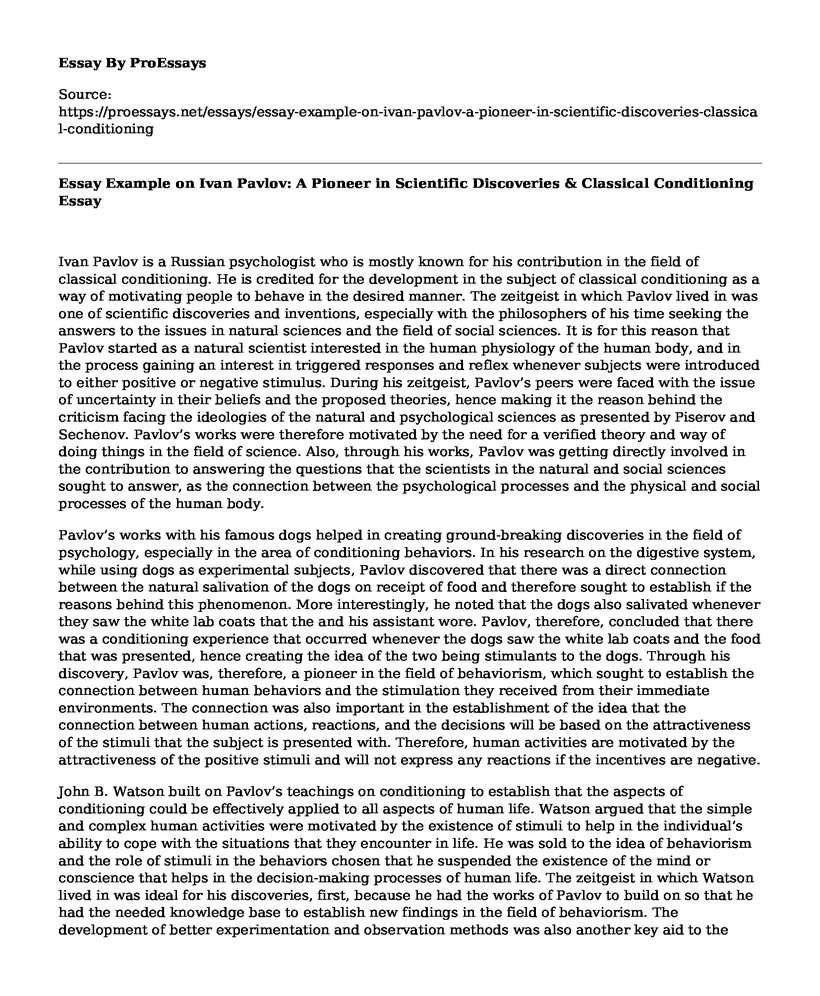Ivan Pavlov is a Russian psychologist who is mostly known for his contribution in the field of classical conditioning. He is credited for the development in the subject of classical conditioning as a way of motivating people to behave in the desired manner. The zeitgeist in which Pavlov lived in was one of scientific discoveries and inventions, especially with the philosophers of his time seeking the answers to the issues in natural sciences and the field of social sciences. It is for this reason that Pavlov started as a natural scientist interested in the human physiology of the human body, and in the process gaining an interest in triggered responses and reflex whenever subjects were introduced to either positive or negative stimulus. During his zeitgeist, Pavlov’s peers were faced with the issue of uncertainty in their beliefs and the proposed theories, hence making it the reason behind the criticism facing the ideologies of the natural and psychological sciences as presented by Piserov and Sechenov. Pavlov’s works were therefore motivated by the need for a verified theory and way of doing things in the field of science. Also, through his works, Pavlov was getting directly involved in the contribution to answering the questions that the scientists in the natural and social sciences sought to answer, as the connection between the psychological processes and the physical and social processes of the human body.
Pavlov’s works with his famous dogs helped in creating ground-breaking discoveries in the field of psychology, especially in the area of conditioning behaviors. In his research on the digestive system, while using dogs as experimental subjects, Pavlov discovered that there was a direct connection between the natural salivation of the dogs on receipt of food and therefore sought to establish if the reasons behind this phenomenon. More interestingly, he noted that the dogs also salivated whenever they saw the white lab coats that the and his assistant wore. Pavlov, therefore, concluded that there was a conditioning experience that occurred whenever the dogs saw the white lab coats and the food that was presented, hence creating the idea of the two being stimulants to the dogs. Through his discovery, Pavlov was, therefore, a pioneer in the field of behaviorism, which sought to establish the connection between human behaviors and the stimulation they received from their immediate environments. The connection was also important in the establishment of the idea that the connection between human actions, reactions, and the decisions will be based on the attractiveness of the stimuli that the subject is presented with. Therefore, human activities are motivated by the attractiveness of the positive stimuli and will not express any reactions if the incentives are negative.
John B. Watson built on Pavlov’s teachings on conditioning to establish that the aspects of conditioning could be effectively applied to all aspects of human life. Watson argued that the simple and complex human activities were motivated by the existence of stimuli to help in the individual’s ability to cope with the situations that they encounter in life. He was sold to the idea of behaviorism and the role of stimuli in the behaviors chosen that he suspended the existence of the mind or conscience that helps in the decision-making processes of human life. The zeitgeist in which Watson lived in was ideal for his discoveries, first, because he had the works of Pavlov to build on so that he had the needed knowledge base to establish new findings in the field of behaviorism. The development of better experimentation and observation methods was also another key aid to the works of Watson being more effective in their execution and the ability of the findings being applied even more effectively in the relevant fields.
Robert Trivers is a sociobiologist who has built on the works of Pavlov and Watson to exploit the field further to establish facts on the contemporary issues facing the society; the scientist has conducted extensive research on the topics of reciprocal altruism, parental investment, and parental-offspring conflicts. In the theories, Trivers sought to establish the connection between the motivations to act desirably by weighing the actions that one sought to undertake against the benefits that they stood to achieve by undertaking the set of actions. For example, in the case of reciprocal altruism, the main idea was that the stimulus for the decision to act in a particular way is the possibility of the acting party achieving similar favors from the person that they are helping at a later time. Additionally, in the parental investment aspect, the parents’ motivation to take care of their offspring is to see their children prosper later in life and also the possibility of the children helping them in their old age. The works proposed by Trivers are relevant to contemporary society since they are set in recent times and, therefore address the issues that face the people in modern times.
Cite this page
Essay Example on Ivan Pavlov: A Pioneer in Scientific Discoveries & Classical Conditioning. (2023, Sep 02). Retrieved from https://proessays.net/essays/essay-example-on-ivan-pavlov-a-pioneer-in-scientific-discoveries-classical-conditioning
If you are the original author of this essay and no longer wish to have it published on the ProEssays website, please click below to request its removal:
- The Impact of Gender Roles in "Girl" by Jamaica Kincaid Essay
- Film Analysis Essay on The New Asylums: Treatment Of Mentally Ill Offenders
- Essay Sample on Love Triangle Theory and Colors of Love Theory
- Essay Sample on Community Prevention Program
- Pharmacotherapeutic Agents in the Treatment of Mental Health Disorders Essay
- Essay Example on Loss of Chinese Culture in US: Impacts of Cultural Imperialism
- Essay Example on Down & Out: The 1930s Great Depression Letters of Hope







